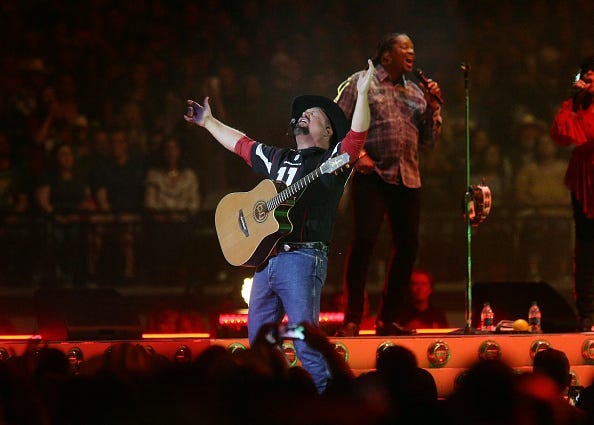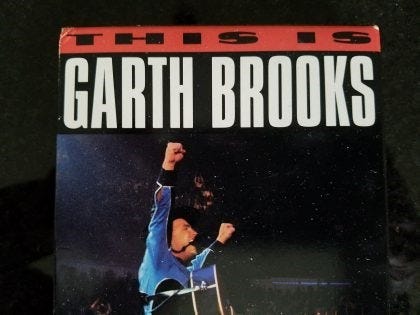
It’s as important a moment in Pop Culture as The Beatles on Ed Sullivan.
And yet there’s virtually nothing about it anywhere, even on his official website.
But on Friday, January 17th, 1992, 9PM, Garth Brooks put America on notice that Country Music would no longer take a back seat to Rock…or Pop…or anything.
This special introduced us all to the Third Verses of both “The Thunder Rolls” and “Friends In Low Places.”

What made this such an historic occasion?
Well, before Garth Brooks, Country existed in the backwaters of Pop Culture.
Sure, there was Hee-Haw.
Glen Campbell, Johnny Cash and Barbara Mandrell also had hit TV shows.
Kenny Rogers, Crystal Gayle and others saw success on Top 40 radio as “crossover artists.”
But such exposure rarely brought new fans to Country Music.
The Outlaw Revolution took place outside the spotlight of Pop Culture. And few outside Country noticed when in 1986, Randy Travis tossed a musical stick of dynamite at the entire Nashville establishment, planting the seeds that would take Country center stage.
By 1991, the Boomer generation was seeking alternatives to an increasingly stale Pop/Rock scene; often finding them in the likes of Travis Tritt, Alan Jackson, Reba and George Strait.
That same year, Soundscan technology to track music sales began…and Country Music turned out to be more popular than anyone had imagined.
For the first time, the most popular songs in America included tunes that were too Country to be Pop hits…like “Friends In Low Places” and “The Thunder Rolls.”
And then Garth answered the question in a TV special filled with Country Music and no small measure of humor.
The Billboard 200 Album Chart had been a horse race between Michael Jackson, Nirvana (who themselves were reinventing Rock) and Garth Brooks.
Garth, and by association, Country Music, won.
Actually, to a slightly lesser extent, so did Nirvana, whose Grunge sound eventually influenced the entire mainstream of Pop/Rock culture.
Which brings us back to my original point.
Once, there was a discernible Mass Culture in music. Top 40 drove that culture. Most of your friends, classmates, co-workers were aware of the hits and the artists who made them.
But from 1992 forward, Country Music became as popular as Pop itself, eventually splitting Mass Culture in two and destroying Top 40’s power to drive it.
Country concerts grew from intimate halls and state fairs to amphitheaters, stadiums and outdoor festivals, breaking records along the way. An estimated 980,000 saw Garth Brooks’ free show in Central Park in 1997.
And in US album sales, Brooks tops all solo artists. Even Elvis.
He wasn’t the first Everyman to strike a chord with the public. But he DID have the right songs – and presentation – at exactly the right time. And ONLY Country radio/TV played his music.
Garth Brooks’ popularity benefited the entire genre.
Proof?
The #2 best-selling Country artist, George Strait, has outsold even The Rolling Stones.
